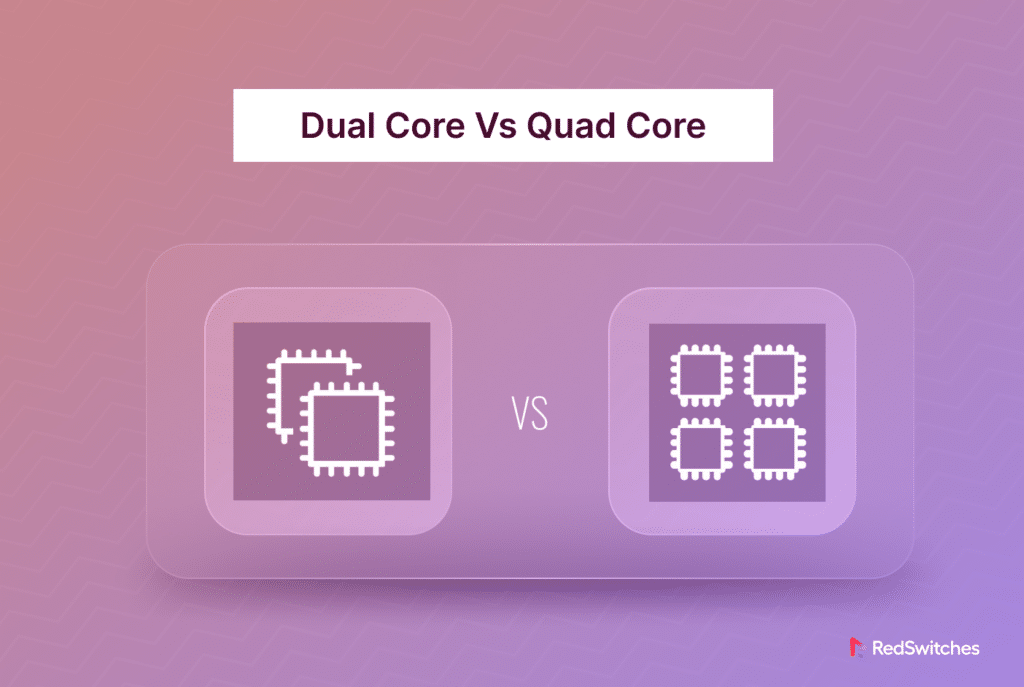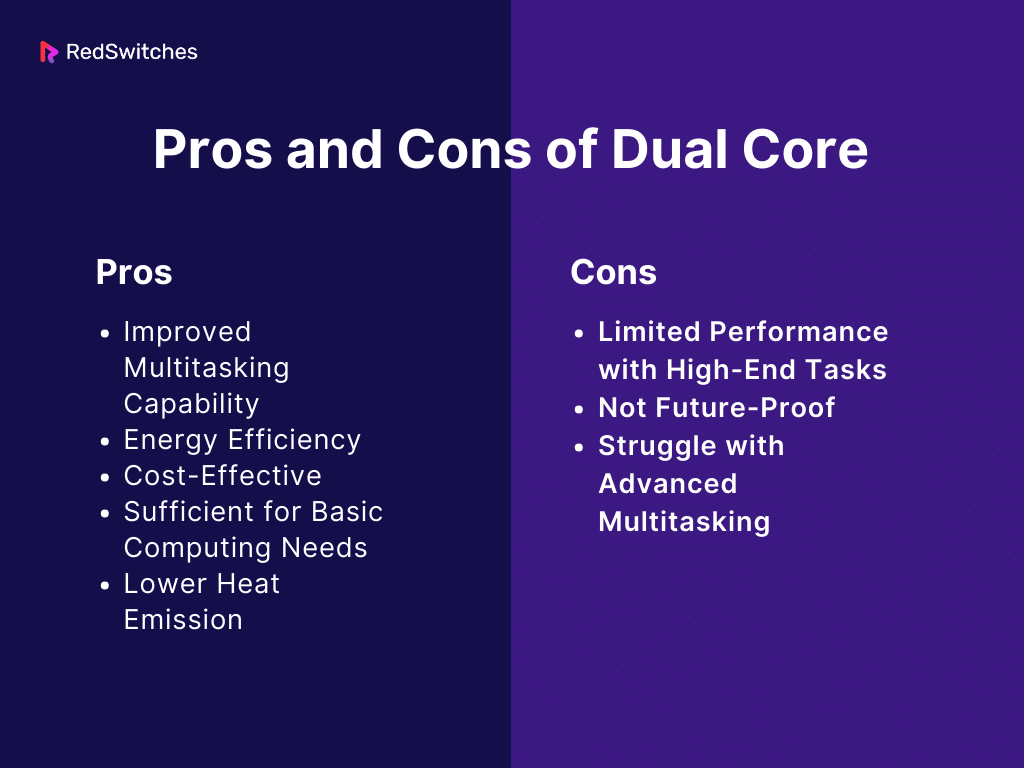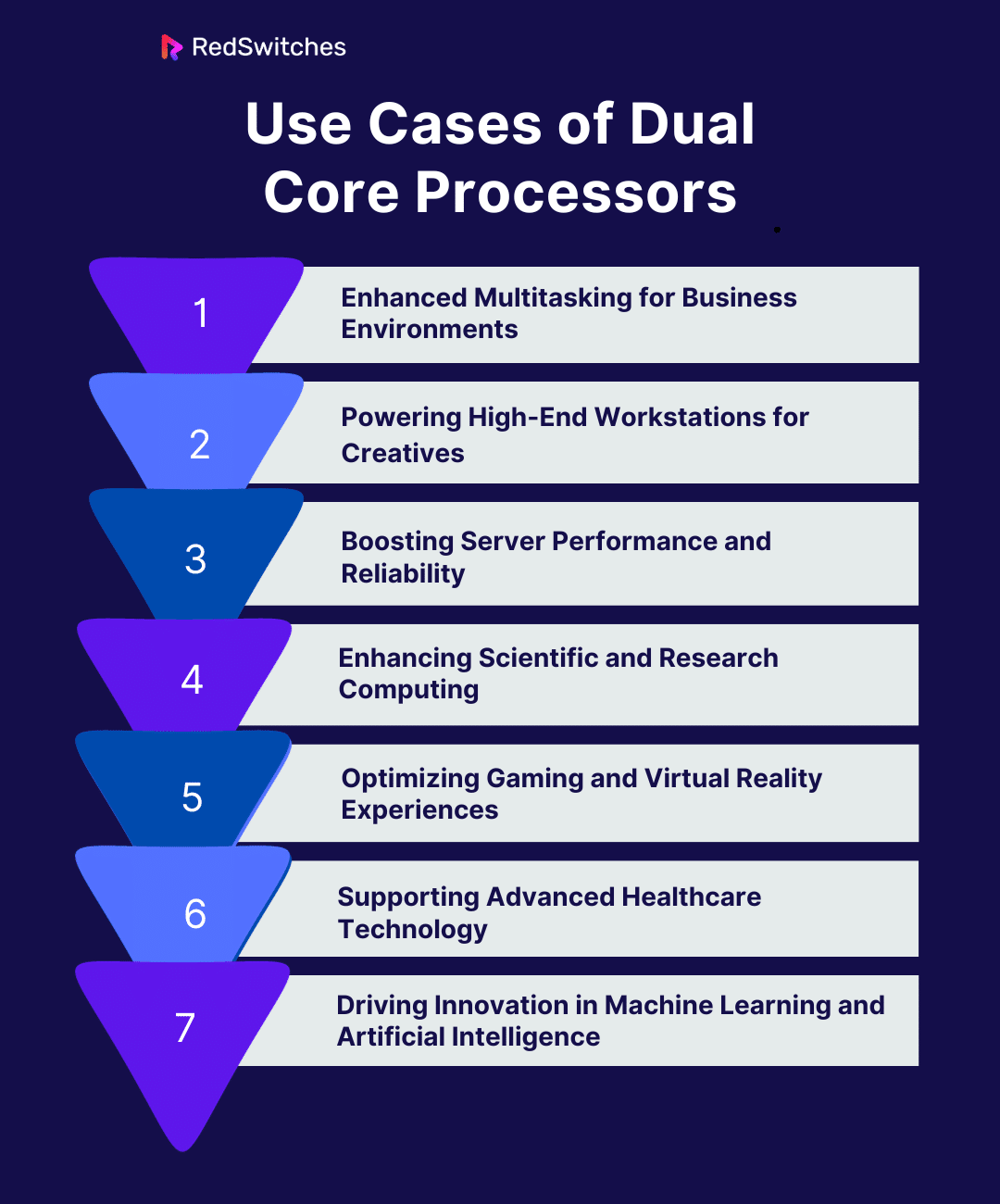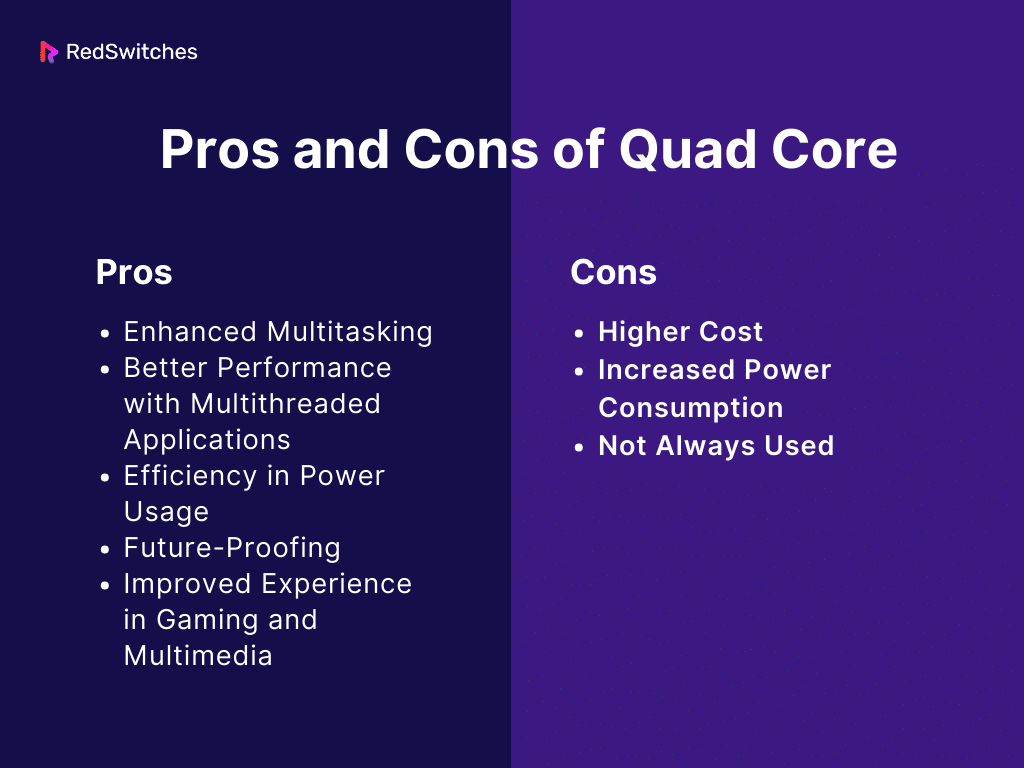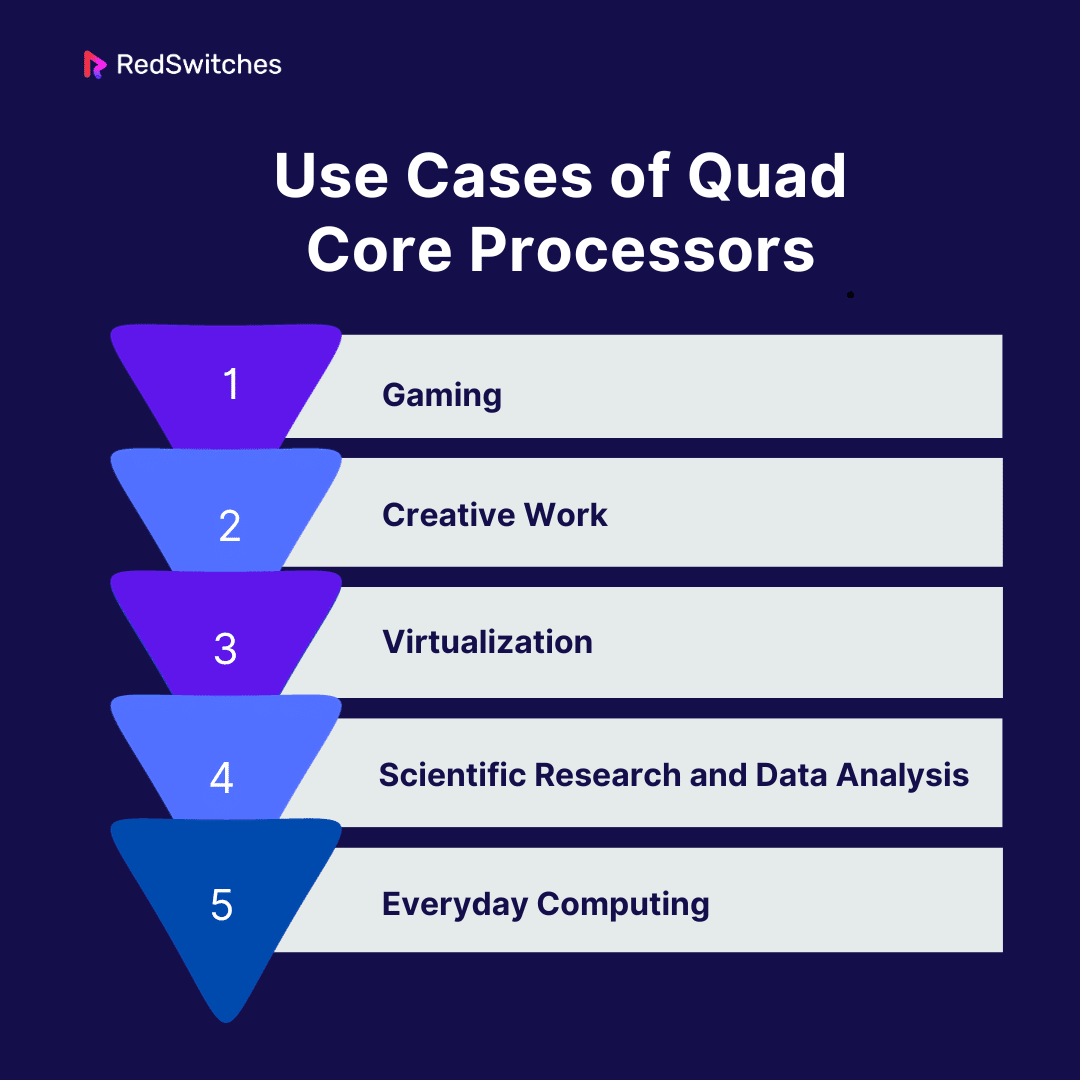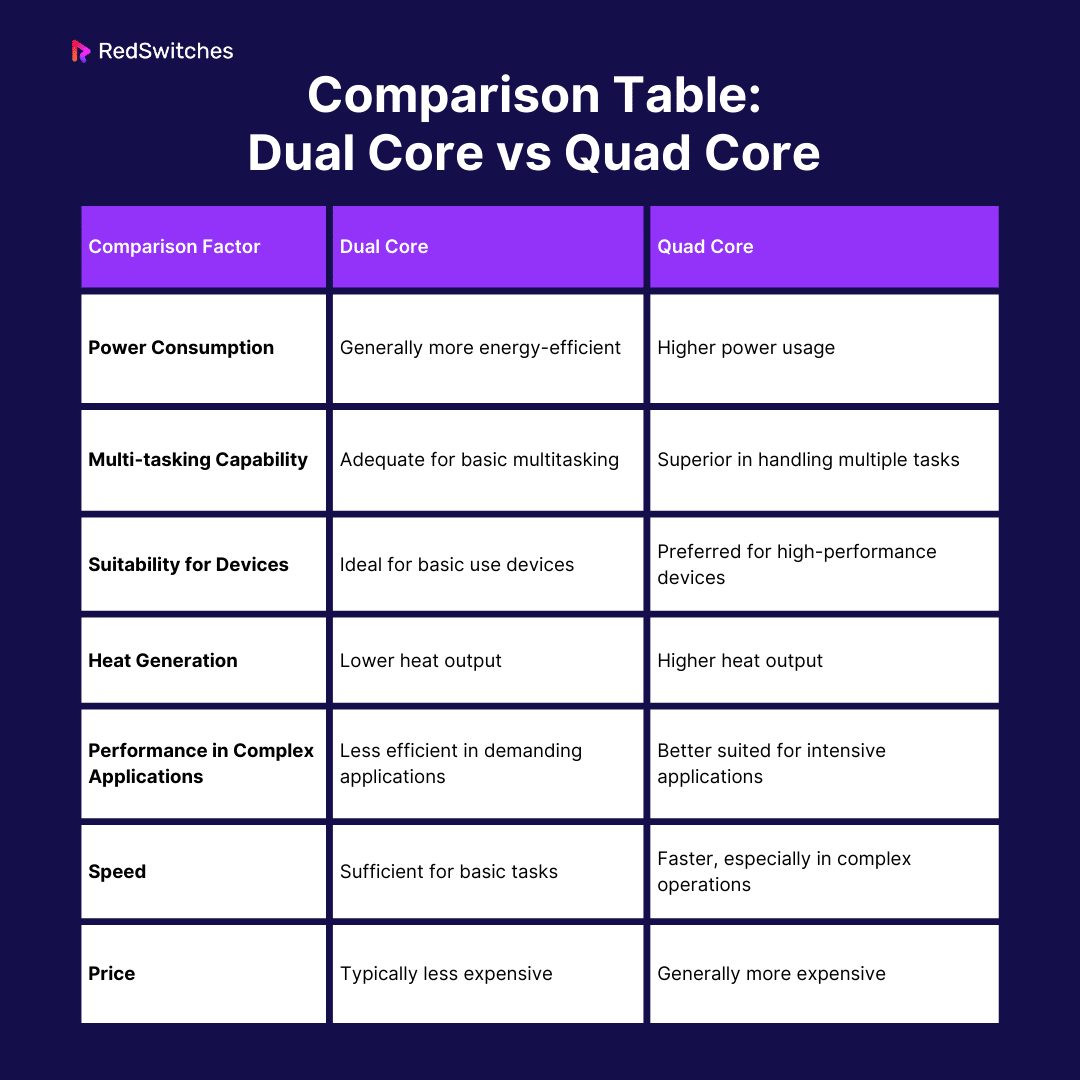Key Takeaways
- Dual-core processors are best for basic tasks and budget-friendliness.
- Quad-core processors excel at multitasking and demanding software.
- Future software will increasingly favor quad-core or higher processors.
- Dual cores offer lower power consumption, which is good for laptops.
- Quad-cores offer faster speeds, especially in complex tasks.
- Quad-cores generate more heat, needing better cooling.
- For gaming, quad-core processors generally offer a smoother experience.
- Consider your specific needs: basic use vs. power-user applications.
- Balance your budget against the performance gains of a quad-core.
Processors are the heart of our devices. They dictate all the important factors for our computing devices, from performance to efficiency. The debate between dual-core vs quad-core processors is a topic of keen interest.
Although both dual-core and quad-core are popular for various computing applications, it is important to consider various factors when choosing between the two to ensure you pick the best fit.
This blog will compare dual core vs quad core processors, exploring their differences, strengths, and ideal use cases. We aim to offer clarity and guidance in choosing the correct processor type for your computing needs.
Table of Contents
- Key Takeaways
- What is Dual Core?
- What is Quad Core?
- The Difference Between Dual Core vs Quad-Core CPUs
- Dual Core vs Quad Core – Power Consumption
- Dual Core vs Quad Core – Multi-tasking Capability
- Dual Core vs Quad Core – Suitability for Devices
- Dual Core vs Quad Core – Heat Generation
- Dual Core vs Quad Core – Performance in Complex Applications
- Dual Core vs Quad Core – Speed
- Dual Core vs Quad Core – Price
- What is Better for PC Gaming? Dual Core vs Quad Core?
- Should You Get More Cores?
- Which to Choose: Dual Core vs Quad Core
- Conclusion – Dual Core vs Quad Core
- FAQs
What is Dual Core?
Credits: FreePik
Before we compare dual core processor vs quad core, it is important to discuss their individual definitions.
A Dual Core processor is a computer processor type consisting of two independent units called ‘cores’ integrated into a single IC (Integrated Circuit). This design allows the processor to perform multiple tasks more efficiently than a single-core processor. Each core in a dual-core processor can work on different tasks simultaneously. This improves the computer’s overall performance, especially in multitasking and basic computational tasks.
Dual-core processors are commonly found in various computing devices. They balance performance and energy efficiency, making them suitable for everyday computing. Despite being overshadowed by more advanced multi-core processors in high-end computing, dual-core processors remain relevant for their cost-effectiveness and energy efficiency.
Do you want to learn the difference between CPU cores vs threads? Read our informative blog, ‘CPU Cores Vs Threads: 4 Things You Must Know.’
Pros and Cons of Dual Core
Below are the pros and cons of dual-core processors:
Pros
- Improved Multitasking Capability: One of the top advantages of a dual-core processor is its ability to handle multitasking more efficiently than a single-core processor. With two cores, the processor can manage multiple tasks simultaneously, ideal for users who like to run several applications simultaneously.
- Energy Efficiency: Dual-core processors are generally more energy-efficient than their higher-core counterparts. This efficiency benefits laptops and mobile devices, leading to longer battery life.
- Cost-Effective: Regarding affordability, dual-core processors often have the upper hand. They are typically less expensive than quad-core or higher-core processors, making them a budget-friendly option for everyday computers and entry-level laptops.
- Sufficient for Basic Computing Needs: A dual processor does well for basic tasks like web browsing, document editing, and media playback. It offers a smooth experience without the need for the extra power that comes with more cores.
- Lower Heat Emission: Dual-core processors usually produce less heat than processors with more cores. This lower heat emission means that devices with dual-core processors often don’t need elaborate cooling systems, which can be advantageous in thinner laptops and compact devices.
Cons
- Limited Performance with High-End Tasks: Dual processors fall short in terms of high-end gaming, video editing, or 3D rendering. These tasks require more processing power and are better handled by quad-core or higher processors.
- Not Future-Proof: As software and applications become increasingly demanding, dual-core processors might struggle to keep up in the long run. A processor with more cores might be a better investment for users looking for a machine that stays competent for several years.
- Struggle with Advanced Multitasking: While dual-core processors handle multitasking well, they may lack in terms of performance when dealing with complex or numerous multitasking scenarios. This limitation can be a drawback for power users who must run several intensive applications simultaneously.
Use Cases of Dual Core Processors
Below are the use cases of dual core processors:
Enhanced Multitasking for Business Environments
Dual processors shine by facilitating smooth multitasking in the business world. These systems can handle multiple applications simultaneously, from data processing to complex analytics. This capability is particularly beneficial in environments like financial trading, where real-time data analysis and rapid response times are crucial.
Powering High-End Workstations for Creatives
Creative professionals, including graphic designers, video editors, and animators, often rely on high-end workstations equipped with dual processors. These setups offer the computational horsepower needed for rendering high-resolution graphics, editing 4K videos, and running demanding design software. This translates to reduced rendering times and a more efficient creative process.
Boosting Server Performance and Reliability
Servers equipped with dual processors are a staple in data centers. They excel in managing high traffic, ensuring server uptime, and providing redundancy. For web hosting, cloud computing, and database management, dual processors offer the reliability and performance necessary for handling large volumes of data and simultaneous requests from multiple users.
Enhancing Scientific and Research Computing
Dual processors are invaluable in scientific research, where complex simulations and data analysis are routine. They enable researchers to process large datasets more quickly, simulate molecular models, and perform advanced computational tasks, thereby accelerating scientific discovery.
Optimizing Gaming and Virtual Reality Experiences
Credits: FreePik
Dual processors benefit the gaming industry immensely, especially in PC gaming and virtual reality. These processors provide the power to run games at high frame rates and resolutions, ensuring a smooth and immersive gaming experience.
Supporting Advanced Healthcare Technology
Healthcare technology relies on dual processors for enhanced performance, particularly in medical imaging and telemedicine. They facilitate faster image processing in MRI and CT scans, aid in complex medical analyses, and support the growing demands of telehealth services.
Driving Innovation in Machine Learning and Artificial Intelligence
Artificial intelligence and machine learning applications, known for their intensive computational demands, leverage dual processors for increased processing speed. This accelerates AI model training times and enhances the capability to process large datasets, which is critical in fields like autonomous vehicles and predictive analytics.
What is Quad Core?
A quad-core processor is a CPU (Central Processing Unit) featuring four cores. Each core can run its own instructions independently. This allows for more efficient multitasking and performance enhancements, especially in multi-threaded applications. This design is particularly beneficial in scenarios that demand high processing power, including video editing, gaming, and running complex software.
Compared to its dual-core counterparts, a quad-core processor can handle more tasks simultaneously, reducing the time for data processing and increasing the overall speed of the system. This makes it an ideal choice for power users who need their computers to perform intensive tasks without lag.
Modern operating systems and applications are increasingly designed to use multi-core processors. This is because a quad-core CPU can significantly improve the performance of a wide range of software. It’s important to note that quad-core processors may consume more power and generate more heat than dual-core processors. This can be a consideration for mobile devices where battery life and heat management are crucial.
Pros and Cons of Quad Core
Below are the pros and cons of quad-core processors:
Pros
- Enhanced Multitasking: One of the most significant advantages of quad-core processors is their ability to handle multiple tasks simultaneously. With four cores, a computer can run several applications simultaneously without significant slowdowns. This makes quad-core processors ideal for users who must juggle numerous tasks simultaneously.
- Better Performance with Multithreaded Applications: These processors excel in running applications designed to split their workload across multiple cores, known as multithreading. This means improved performance in complex software like video editing tools, 3D rendering software, and advanced gaming applications.
- Efficiency in Power Usage: Quad-core processors often manage power more efficiently than single-core or dual-core processors under heavy usage. They can allocate tasks across cores, preventing any single core from becoming overburdened and overheating.
- Future-Proofing: As software and applications evolve, they increasingly require more processing power. Quad-core processors offer a degree of future-proofing, ensuring your device remains compatible with new and more demanding software updates.
- Improved Experience in Gaming and Multimedia: For gamers and multimedia enthusiasts, quad-core processors provide a smoother and more immersive experience. The additional cores handle gaming graphics and high-definition video playback more effectively, reducing lag and improving overall performance.
Cons
- Higher Cost: One of the primary drawbacks of quad-core processors is their cost. They are generally more expensive than their dual-core counterparts, making them a more significant investment, particularly for those without additional processing power.
- Increased Power Consumption: While efficient under heavy loads, quad-core processors can consume more power than dual-core processors. This can lead to shorter battery life in laptops and higher energy usage in desktops.
- Not Always Used: Not all applications are designed to use multiple cores. In some cases, the additional cores in a quad-core processor might remain underutilized, not providing any significant performance benefit over a dual-core processor in these scenarios.
Use Cases of Quad Core Processors
Below are the use cases of quad-core processors:
Gaming
Quad-core processors have become an integral part of the gaming industry. Modern games, especially those with complex graphics and physics, demand high processing power for a smooth, lag-free experience. Quad-core processors provide the necessary horsepower to run these games efficiently, ensuring smooth and immersive gameplay.
Creative Work
Creative professionals such as video editors, graphic designers, and animators require powerful systems to handle resource-intensive software. Applications like Adobe Premiere Pro, and 3D rendering software benefit significantly from quad-core processors.
These processors speed up rendering times, improve playback performance, and allow smoother operation of complex tasks like video encoding, image processing, and large-scale compilations.
Virtualization
Virtualization involves running multiple operating systems simultaneously on a single physical machine. Quad-core processors are particularly suited for this task as they can allocate a dedicated core to each virtual machine.
This setup benefits software developers testing applications across different operating systems, IT professionals managing server environments, and users who need to operate both Windows and Linux systems.
Scientific Research and Data Analysis
Scientific research and data analysis often involve handling large data sets and complex calculations. Quad-core processors enable faster data processing, making them an essential tool for researchers and scientists. They are instrumental in areas like bioinformatics, statistical analysis, and computational physics, where speed and accuracy are critical.
Everyday Computing
A quad-core processor significantly improves general computer usage for average users. Tasks like opening large spreadsheets, streaming high-definition videos, and compressing files are faster and more efficient. Even routine activities like web browsing become smoother as each tab can be handled by a different core, improving overall responsiveness.
Now that have have discussed the individual definitions, pros and cons, and use cases of dual-core processor vs quad-core processor, let’s go over the differences between dual processor vs quad-core.
Also Read: Top 5 Best Linux Distros For Developers.
The Difference Between Dual Core vs Quad-Core CPUs
Below is the key differences between dual core vs quad-core processors:
Dual Core vs Quad Core – Power Consumption
Dual-core processors typically consume less power than quad-core processors, making them more energy-efficient for basic computing needs.
Dual Core
Power consumption stands out when discussing the difference between dual and quad-core processor. When comparing dual core vs quad-core, dual-core processors are generally more energy-efficient. With just two cores, they consume less power, making them ideal for devices where energy efficiency is essential. Some examples include laptops or budget smartphones.
This lower power consumption also means that Dual Core CPUs typically generate less heat, which benefits smaller devices or systems with limited cooling capabilities.
Quad Core
Quad Core CPUs consume more power. This is due to the additional cores that can execute more tasks simultaneously, requiring more energy.
While this increased power consumption can lead to higher performance, it also means that these processors might generate more heat and may not be as battery-friendly in portable devices. This trade-off is often acceptable in environments where high performance is necessary, such as gaming PCs or advanced workstations.
Dual Core vs Quad Core – Multi-tasking Capability
Quad-core processors excel in multi-tasking environments by efficiently handling multiple processes at once.
Dual Core
Dual-core processors can handle considerable multitasking. They can efficiently manage everyday tasks like web browsing, office applications, or media playback without significant slowdowns.
However, dual-core CPUs may struggle to keep up with more demanding scenarios, like running multiple resource-intensive applications simultaneously. This can lead to slower performance.
Quad Core
Quad Core CPUs are known for their multitasking capabilities. With four cores, these processors can handle multiple processes at the same time more effectively. This makes them best suited for power users who need to run several applications concurrently or for software that can leverage multiple cores simultaneously. Some examples include video editing software, 3D rendering tools, and modern games.
The improved multitasking capability of Quad Core CPUs translates into smoother performance and faster processing times in these demanding scenarios.
Dual Core vs Quad Core – Suitability for Devices
Dual-core processors are well-suited for devices requiring lower power consumption and heat generation. Whereas quad-core processors are favored in high-performance computing devices.
Dual Core
Dual Core processors are more commonly found in budget-friendly devices, including entry-level laptops, smartphones, and older computer models. These processors can easily handle everyday tasks such as web browsing, document editing, and media playback.
They are an excellent choice for users with moderate computing needs, where complex processing isn’t a frequent requirement. Due to their lower power consumption, they’re also preferred in devices where battery life is a priority. This includes budget smartphones or portable laptops.
Quad Core
Quad Core CPUs are curated for more demanding tasks. They shine in devices targeted at gaming, heavy multitasking, and professional applications like video editing, 3D rendering, and software development.
Modern smartphones, gaming consoles, higher-end laptops, and desktops often boast Quad Core processors. These CPUs can handle more applications simultaneously and are better suited for future-proofing devices against more demanding software updates and applications.
Are you contemplating between Intel vs AMD? Make an informed decision by reading this piece: Intel Vs AMD: Which CPU Is The Best For Your Project?
Dual Core vs Quad Core – Heat Generation
Quad-core processors generally produce more heat due to their higher power usage. Requiring more effective cooling solutions than dual-core processors.
Dual Core
Dual Core processors generally generate less heat due to fewer cores working simultaneously. This reduced heat output translates to more straightforward cooling requirements, making them ideal for thinner, lighter devices with limited space for cooling systems. The lower heat emission also contributes to better energy efficiency, making these processors a fit for devices where conserving battery life is crucial.
Quad Core
Quad Core processors are known for generating more heat. This is because they have more cores, which can work intensively when running complex tasks or multiple applications.
Devices with Quad Core CPUs often require more robust cooling solutions, such as advanced heat sinks or liquid cooling systems in high-performance devices like gaming laptops and desktops. The increased heat can also impact the device’s overall power consumption and may shorten battery life in portable devices.
Dual Core vs Quad Core – Performance in Complex Applications
For complex applications and demanding workloads, quad-core processors provide superior performance, leveraging multiple cores for enhanced processing power.
Dual Core
Dual-core processors offer a decent performance level for most general computing tasks. They can handle day-to-day applications like web browsing, basic office tasks, and light media consumption.
However, dual-core CPUs may struggle when it comes to more demanding applications, such as high-resolution video editing, 3D rendering, or heavy multitasking. They can handle these tasks to a certain extent, but the processing speed and efficiency might not be optimal, leading to longer rendering times and potential system lags.
Quad Core
Quad-core CPUs excel in complex applications. With four processing units, they can handle more data simultaneously. This makes a significant difference in computing power, particularly noticeable in resource-intensive tasks. For instance, a quad-core processor can handle more simultaneous video tracks or effects without bogging down in video editing.
Similarly, quad-core processors provide smoother and more efficient performance for gaming, 3D rendering, and heavy multitasking. The additional cores allow these CPUs to manage multiple complex tasks at once without significant performance drops, making them ideal for power users who need that extra processing muscle.
Dual Core vs Quad Core – Speed
Credits: Pexels
While quad-core processors offer faster processing speeds for multi-threaded applications. Dual-core processors can be equally efficient for tasks that do not leverage multiple cores.
Dual Core
The speed of a dual-core processor is generally sufficient for basic computing needs. Dual-core CPUs can perform quite efficiently for tasks that don’t require a lot of simultaneous processing, such as basic web browsing, office applications, and media playback.
Their speed is more than adequate for single-threaded tasks or applications that don’t leverage multiple cores effectively. Dual-core processors can also be a more energy-efficient option, often leading to longer battery life in mobile devices.
Quad Core
Quad-core processors shine when it comes to speed in multi-threaded applications. They can process more instructions simultaneously compared to dual-core CPUs, which translates to faster performance in multitasking and complex, resource-heavy applications.
In scenarios where multiple applications run simultaneously or are designed to take advantage of multiple cores, quad-core CPUs deliver significantly better performance.
This speed advantage is particularly evident in tasks like video encoding, gaming, and running complex algorithms or simulations. However, it’s worth noting that the speed difference may not be as noticeable for simple tasks, and the increased power consumption can result in shorter battery life in portable devices.
Dual Core vs Quad Core – Price
Dual-core processors are cheaper suited for basic tasks. Quad-core processors offer better performance and cost more.
Dual Core
One of the main advantages of dual-core processors is their affordability. They are generally less expensive than higher-core-count CPUs. This factor makes them an attractive option for budget-conscious consumers or use in entry-level devices.
The lower price point does not necessarily mean lower quality but reflects the processor’s limitations in handling complex tasks. Dual-core CPUs are cost-effective for those only using their computers for basic tasks. This includes internet browsing, office applications, and light media consumption.
Quad Core
Quad-core processors come at a higher price. This increase in cost is justified by their enhanced capabilities, especially in handling multi-threaded applications and multitasking.
The extra processing power makes them ideal for users who require more robust performance. This includes content creators, gamers, and professionals who use resource-intensive applications. While the initial investment is higher, the benefits in terms of speed, efficiency, and ability to handle complex tasks can make quad-core CPUs a worthwhile purchase for power users.
Also Read: Top 15 Intel Xeon Processors Of 2023.
What is Better for PC Gaming? Dual Core vs Quad Core?
It is common for most gamers looking to invest in a processor to question which between dual-core vs quad quad-core is best. Let’s discuss below:
Gaming Performance
Most games were designed to use one or two cores. This made dual-core processors a better option. However, with the advancement in game design and technology, more modern games are now optimized to use multiple cores. This is where quad-core processors offer smoother gameplay and better handling of demanding game scenarios.
Speed vs. Multitasking
While dual-core processors can offer higher clock speeds, quad-core processors excel in handling multiple tasks simultaneously. In gaming, a quad-core can efficiently run the game while managing background tasks like streaming, recording gameplay, or running communication applications without significant performance hits.
Future-Proofing Your Gaming Setup
With the gaming industry’s rapid evolution, buying a quad-core processor is a way to future-proof your gaming PC. As games become more complex, the ability to process more data simultaneously will become increasingly important. A quad-core processor ensures that your system can handle future game releases.
Heat and Power Considerations
Due to their higher processing abilities, quad-core processors can generate more heat and consume more power than dual-core processors. You might need to invest in better cooling solutions and a higher-rated power supply unit for a quad-core setup.
Budget Considerations
Credits: Pexels
Dual-core processors are more pocket-friendly and can run many games efficiently, especially older or less demanding titles. However, for a more future-proof and versatile gaming experience, investing in a quad-core processor could be worth the additional cost.
Should You Get More Cores?
Whether you should get more cores depends on several factors, including:
Type of Use
- Basic Tasks: A dual-core or quad-core processor should do if you use it to conduct daily computing tasks.
- Heavy Multitasking and Advanced Applications: If you wish to conduct heavy-duty computing and multi-tasking, Quad-core or higher is advisable.
Performance Expectations
- Smooth Multitasking: More cores allow for smoother multitasking and better handling of simultaneous processes.
- Demanding Applications: Additional cores benefit from professional video editing, gaming, and other CPU-intensive tasks.
Future-Proofing
- Technology is ever-evolving. More cores might offer a degree of future-proofing, allowing your system to handle more advanced software and technologies that emerge.
Energy Efficiency and Heat
- More cores can mean higher power consumption and heat generation, demanding enhanced cooling solutions. This is especially important in laptops with crucial battery life and heat management.
Budget
- The more cores, the higher the cost. Balance your performance needs with what you’re willing to spend.
Software Optimization
- Not all software can effectively use a large number of cores. Ensure the applications you use most often will benefit from more cores.
Also Read: Choosing The Right Dedicated Server Specs.
Which to Choose: Dual Core vs Quad Core
Credits: Unsplash
Was the comparison of the difference between dual core and quad core insufficient for you to make an informed decision between dual core vs quad core. Read below for further advice on which to choose between dual core vs quad core:
Dual Core
Choose a dual-core processor if your primary activities include basic computing tasks, including checking emails or general web browsing. It’s ideal if you’re on a tight budget, as dual-core processors are generally more affordable and offer good value for money.
A dual-core processor is ideal for prioritizing longer battery life and portability, especially for laptops. These processors are typically found in lighter, more energy-efficient laptops. This makes them perfect for everyday use and for those who are always on the move.
Quad Core
If your computing involves more demanding tasks like professional video rendering or software development, opt for a quad-core processor. These processors are designed to handle complex, resource-intensive applications and provide smoother multitasking capabilities.
If you frequently run multiple applications simultaneously or use software that benefits from additional cores, a quad-core processor will greatly boost your experience. While they are more expensive, the investment is justified by the notable improvement in performance and speed.
Quad-core processors are also wise for those looking to future-proof their system. They can help ensure a computing setup can run newer, more demanding software and applications emerging in the coming years.
Conclusion – Dual Core vs Quad Core
Various factors must be considered when contemplating dual-core vs quad-core processors. Performance requirements, multitasking needs, and energy efficiency considerations are critical to informed decision-making.
Dual-core processors are sufficient for everyday tasks and energy conservation, while quad-core processors excel in intensive multitasking and demanding applications. Understanding these differences is crucial for making an informed decision about your next device purchase.
RedSwitches offers services catering to diverse technology needs for optimizing their computing infrastructure. From hosting solutions to tailored IT infrastructure, we provide expertise to help you leverage the right technology, including the most suitable processors to match your specific demands.
Explore our website today to discover how we can enhance your computing experience, offering performance and reliability where it matters most.
FAQs
Q. Which is better dual-core or quad-core?
The answer to which is better between dual core vs quad core depends on your use case. Quad-core is better for multitasking and more demanding tasks like video editing, while a dual-core is best for everyday computing needs and is more budget-friendly.
Q. Does quad-core make a difference?
Quad-core processors offer improved performance in multitasking and handling complex or resource-intensive applications compared to dual-core processors.
Q. Which is faster Core 2 DUO or quad-core?
A quad-core processor is typically faster and more efficient than a Core 2 Duo (which is a dual-core processor). This is especially true when considering Core 2 DUO for multitasking and more demanding applications.
Q. Is i5 or quad-core better?
The Intel Core i5 is a brand name and can include both dual-core and quad-core processors. A quad-core i5 would perform better than a dual-core i5, especially for tasks demanding increased processing power.
